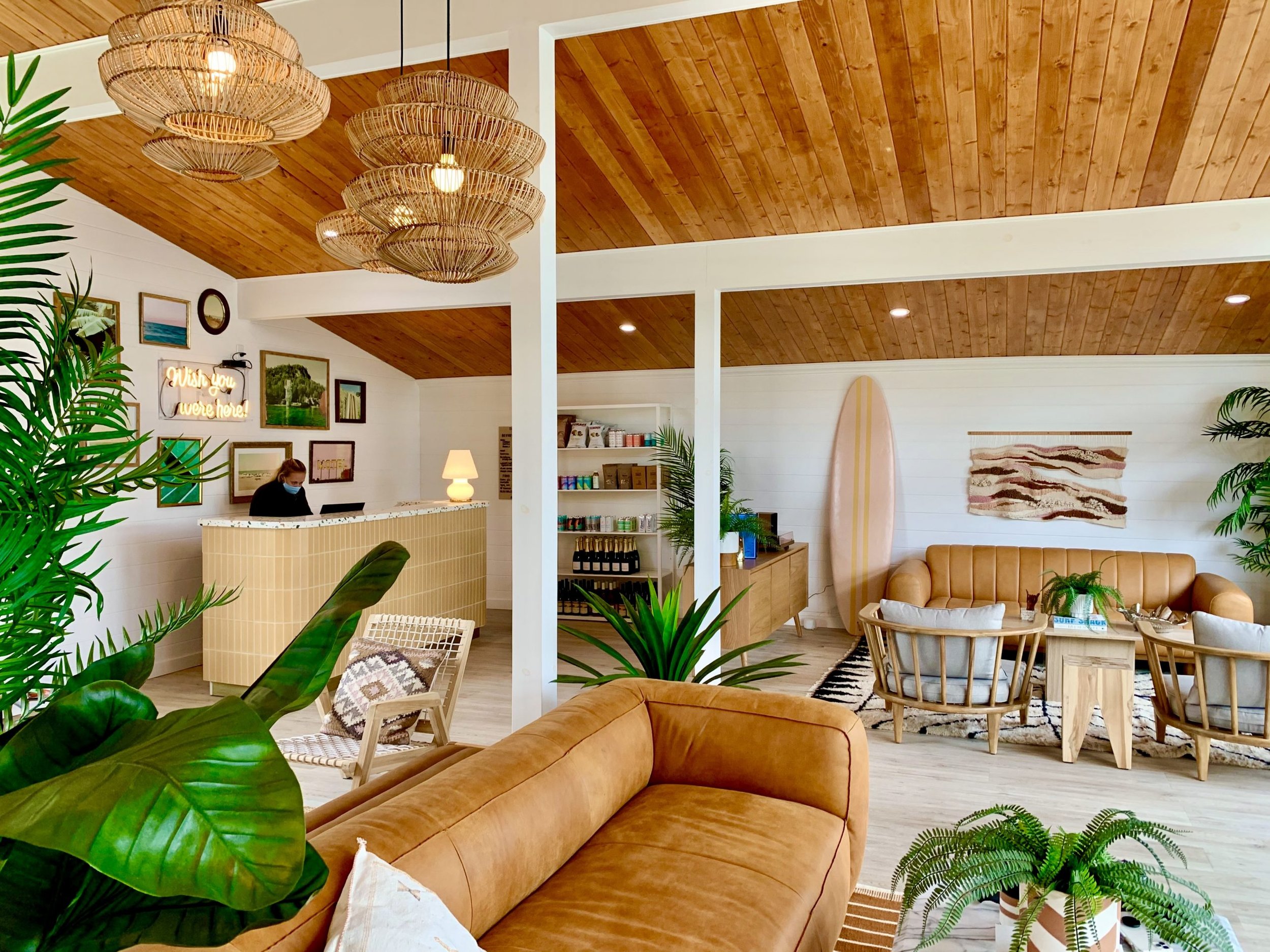Building Resilient Tourism Through Community-Minded Practices
Photo via The June Motel, Sauble Beach.
Finding Our Way Together
Today, something beautiful is happening in the travel and tourism community. Travellers seek more than just an escape—they want to be part of something meaningful, to leave places better than they found them. This shift opens a door for those in tourism to reimagine what hospitality can be.
I've had the privilege of working with The June Motel, a gem of a boutique operation with three properties in rural Ontario, Canada, including Prince Edward County, Sauble Beach and Beaver Valley. What they've taught me about blending sustainability with genuine community connection has been inspirational. In 2022, Swell Impact partnered with them to explore their sustainability journey. I want to share some of the wisdom we co-discovered early in my sustainability consultant career.
Breathing New Life Into Forgotten Places
The June Motel's approach to hospitality starts with seeing potential in the overlooked. In 2016, co-owners Sarah Sklash and April Brown purchased what they described as a "dingy" 16-room Sportsman Motel in Prince Edward County and transformed it with their vision of a "throwback to the good ol' days."
"Our properties are all about providing a weekend getaway within driving distance of urban centers like Toronto." This focus does more than reduce travel emissions—it creates meaningful connections between city dwellers and rural communities while supporting regional economies.
The June actively seeks "diamonds in the rough"—properties with potential that can be transformed while honoring their history. This approach carries both environmental wisdom and cultural reverence. By renovating rather than rebuilding, they've significantly reduced their carbon footprint compared to new construction while preserving the character that makes each location special.
Growing Roots, Not Just Revenue
What's most striking about The June isn't just what they've built but how they've built it—with patience and genuine curiosity about the communities they join.
Before renovating, they operate each property in its original state for an entire season "to get to know the community and what it needs and build local connections." This patience and commitment to listening and relationship-building give them insight into what communities need, not what outsiders might assume.
This approach has created a remarkable impact. A partnership with a local restaurant revived a long-shuttered dining space at their Sauble Beach location. Together, the motel and restaurant now employ over 75 people in a town of just 2,000—a transformative effect in a small community.
In our assessment, The June scored exceptionally well on social impact metrics, particularly gender equality. As a 100% women-owned business that intentionally supports other women entrepreneurs, it creates opportunities throughout these rural economies. Even with the seasonal nature of tourism (89% of its workforce is part-time or seasonal), its commitment to fair employment practices strengthens community bonds that endure year-round.
Honouring Place Through Local Knowledge
Embracing local economic and environmental knowledge creates tourism that's deeply rooted in place rather than imposed upon it. When businesses like The June Motel spend time learning from community members who understand local watersheds, growing seasons, architectural history, and business cycles, they gain insights that no outside consultant could provide.
This exchange transforms tourism from an extractive industry into a regenerative one. Local environmental knowledge helps protect fragile ecosystems while celebrating their uniqueness; local economic knowledge ensures tourism dollars flow through existing community networks rather than bypassing them. Together, these relationships form a resilient ecosystem where businesses can collectively weather challenges, like a pandemic or a trade war, adapt to changing conditions with greater agility, and create authentic experiences that honour a place's distinctive character and heritage. This approach acknowledges a profound truth: the wisdom to sustain a place already exists within the community that calls it home.
Embracing Challenges as Lessons
Let's be honest—renovating older buildings comes with challenges. During our work, we identified specific resource management issues at Sauble Beach: non-metered well water making consumption hard to track, waste generation from the motels and the restaurant, and energy consumption patterns showing their lobby alone using 50% of the property's electricity.
These challenges became catalysts for innovation. Our assessment using the Basic Sustainability Assessment Tool (BSAT) showed that June scored lowest on SDGs 7 (Affordable and Clean Energy) and 13 (Climate Action) due to a lack of consistent tracking and measurement, which isn’t all that unusual for small businesses struggling to do it all—especially in challenging times. These areas became key priorities for benchmarking improvement.
From installing LEDs and insulation to investing in heat pumps and EV chargers, The June set out to increase efficiency and reduce its impact. The assessment illuminated opportunities to improve and provided the insights and shared language to confidently seek funding and partnerships to grow their capacity.
One small but impactful change was investing in long-lasting furnishings, such as umbrellas with 15-year guarantees. This switch to durable materials significantly reduced waste and replacement expenses, demonstrating the power of small, thoughtful decisions that build resilience over time. The June also takes great pride and joy in sourcing vintage pieces throughout their properties, inspiring guests about the culture of reclaiming and reusing.
Making the Business Case for Caring
The hospitality industry faces a significant challenge: According to the Sustainable Hospitality Alliance, to achieve net-zero emissions while accommodating sector growth, we need to reduce carbon emissions by 66% per room by 2030 and 90% per room by 2050.
For The June Motel, which enjoys enviable occupancy rates (100% during high season, 75% during low), sustainability isn't just ethical—it makes business sense. Sustainable buildings are typically 20% more resource-efficient, substantially reducing utility costs in an industry where conventional hotels spend more than $2,000 per room annually on energy and water, representing 6-20% of operating expenses.
Companies actively addressing climate change see an 18% higher return on investment. This financial reality aligns beautifully with what staff members told us through surveys. 83% believed businesses have a crucial role in creating positive change (compared to 67% for individuals).
Starting with Culture, Not Just Infrastructure
Perhaps the most valuable lesson from The June's journey is that sustainability isn't primarily about technology or infrastructure—it's about culture and values.
Before diving into technical solutions, they took time to align sustainability with their core purpose: creating beautiful places where guests and employees can "live the good life." This meant starting with governance—appointing a sustainability lead, developing training programs, embedding sustainability considerations into existing systems, and measuring what matters.
This cultural foundation enabled them to make meaningful changes aligned with their identity rather than imposing sustainability as separate from their core business.
Walking This Path Together: Insights for Fellow Businesses
If you're on a similar journey with your hospitality or tourism business, here are some insights from The June's experience that might light your way. Remember, while each business walks its own path with distinct challenges and untapped potential, we are all stewards of a shared future—bound together in our commitment to places that sustain us and the communities that give them meaning.
Root into purpose. Root your efforts in a clear purpose that reflects your values and vision. This creates a compass that simplifies decision-making and ensures sustainability becomes embedded in your organization's DNA. June’s purpose is to “create beautiful places to stay where you can live the good life,” where the good life extends to all stakeholders.
Honour what came before. Renovating existing properties can reduce environmental impact by 20-40% compared to new construction while preserving the stories and character that make a place special. Consider the full lifecycle impact of your property decisions, including furnishings and other amenities.
Listen first, nurture local connections. Spend time understanding community needs before making changes. The June's approach has led them to directly support 20-30 local small businesses and approximately 20 more indirectly, creating a substantial economic ripple effect in rural areas.
Think in decades, not quarters. Invest in materials that last. Something as simple as choosing umbrellas with 15-year guarantees can significantly reduce waste and replacement costs over time.
Measure to manage. You can't improve what you don't track. The June discovered that their lobby consumed 50% of the property's electricity, a revelation that immediately highlighted where targeted efficiency improvements would make the biggest difference.
Start where it matters most. In hospitality, HVAC and lighting typically represent 45% of energy usage (3% heating, 16% ventilation, 13% cooling, 13% lighting). Focus your initial efforts where the impact will be most significant.
Treat water as precious. Simple solutions like rain barrels for landscaping can make a meaningful difference while more comprehensive solutions like low-flow fixtures and gray water systems are implemented over time.
Make waste visible, then eliminate it. Conduct waste audits to establish baselines, then implement systems to eliminate and reduce waste. Set waste reduction and composting targets and eliminate single-use plastics throughout your properties.
Nurture local biodiversity. Plant gardens with species that belong in your local ecosystem. These create habitats for pollinators and help guests connect with your location's natural character.
Invite your team into the journey. Your staff often has the best ideas for improvement—at The June, 83% of employees believed businesses play a critical role in sustainability efforts. Create channels for their suggestions and celebrate their leadership.
Share your story honestly. Communicate your sustainability efforts with humility and authenticity, focusing on real achievements rather than aspirational goals. Celebrate your wins!
Engage and delight your guests in taking part. Invite guests into your sustainability story through moments of delight—from organizing a beach clean-up to offering free bicycles for exploration—transforming sustainable choices into memorable experiences that make their stay meaningful.
Tools and Frameworks Used for The June Motel
While working with The June Motel, we used the following open-source tools you can use in your business:
Basic Sustainability Assessment Tool (BSAT) by Sustainability Advantage
The Flourishing Business Canvas (FBC) by Flourishing Business
Pathway to Net Positive Hospitality for The Planet by the Sustainability Hospitality Alliance
The Heart of Resilience
What makes The June Motel's approach to sustainability so powerful isn't just the specific practices it has adopted and how it has woven them into a larger story of community care and connection. It understands that true resilience comes from relationships—with guests, staff, local businesses, and the land.
In the end, perhaps that's the most important lesson for all of us in tourism: our businesses thrive when our communities thrive. By approaching sustainability as a community practice rather than just an operational checklist, we create the conditions for lasting resilience—where beautiful guest experiences and vibrant local communities naturally go hand in hand.
References
Sustainable Hospitality Alliance (2020). Business Case for Sustainable Hotels. https://sustainablehospitalityalliance.org/resource/business-case-for-sustainable-hotels/
Sustainable Hospitality Alliance (2020). Pathway to Net Positive Hospitality for The Planet. https://sustainablehospitalityalliance.org/our-work/pathway/
The Global Goals (2025). The 17 Goals (SDGs). https://www.globalgoals.org/goals/
Upward, A. (2025). Flourishing Business Canvas. https://flourishingbusiness.org/download-flourishing-business-canvas/
Willard, B. (2025). Basic Sustainability Assessment Tool. https://sustainabilityadvantage.com/assessments/bsat/
Barber, N. A., & Deale, C. (2014). Tapping Mindfulness to Shape Hotel Guests' Sustainable Behavior. Cornell Hospitality Quarterly, 55(1), 100–114. https://doi.org/10.1177/1938965513496315
Calisto, M. de L., Umbelino, J., Gonçalves, A., & Viegas, C. (2021). Environmental Sustainability Strategies for Smaller Companies in the Hotel Industry: Doing the Right Thing or Doing Things Right? Sustainability, 13(18), 10380. https://doi.org/10.3390/su131810380
Line, N. D., Hanks, L., & Miao, L. (2018). Image Matters: Incentivizing Green Tourism Behavior. Journal of Travel Research, 57(3), 296–309. https://doi.org/10.1177/0047287517697848
Preziosi, M.; Acampora, A.; Lucchetti, M.C.; Merli, R. (2022). Delighting Hotel Guests with Sustainability: Revamping Importance-Performance Analysis in the Light of the Three-Factor Theory of Customer Satisfaction. Sustainability 2022, 14, 3575. https://doi.org/10.3390/su14063575
Rubio-Mozos, E., García-Muiña, F. E., & Fuentes-Moraleda, L. (2020). Sustainable Strategic Management Model for Hotel Companies: A Multi-Stakeholder Proposal to "Walk the Talk" toward SDGs. Sustainability, 12(20), 8652. MDPI AG. Retrieved from http://dx.doi.org/10.3390/su12208652

